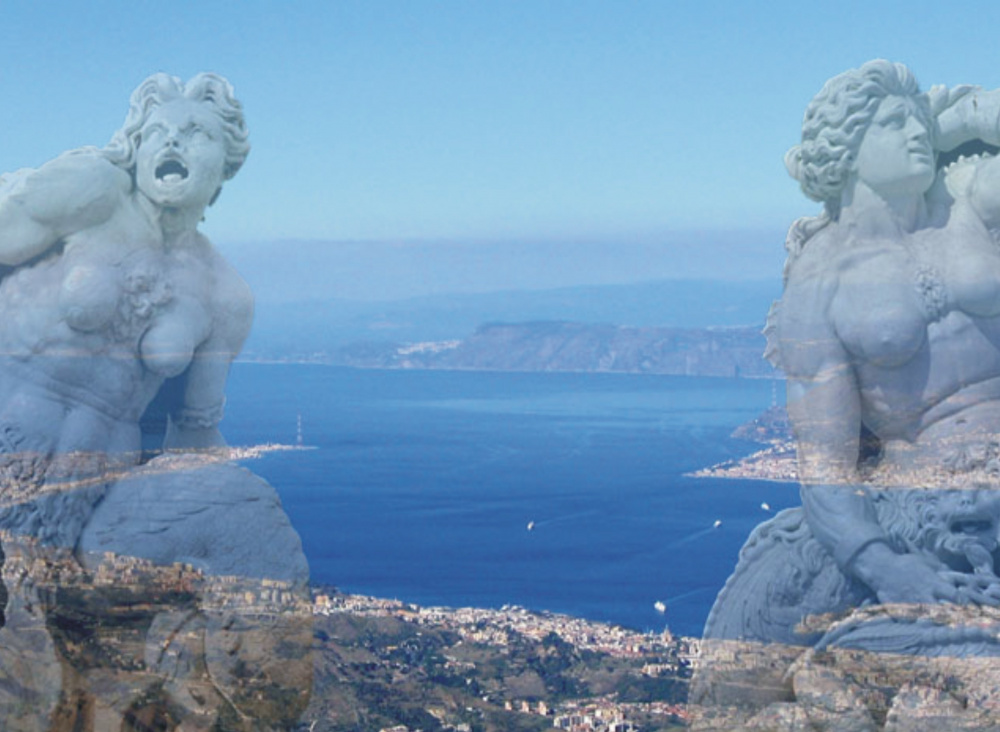The two cliffs, overlooking the Strait of Messina, have been known since ancient times for the danger they represented for navigation and believed to be home to two terrible monsters. Scylla, on the cliff near Reggio Calabria, had twelve legs and six long necks surmounted by as many heads. In each of the six mouths it had three rows of teeth and barked like a dog. Charybdis, on the Sicilian coast, stood invisible under a tall fig tree and three times a day swallowed the waters of the strait, later rejecting them at sea.
Scylla, daughter of Crataeis, was a wonderful nymph, who used to go to the rocks of Zancle (Messina) to walk barefoot on the beach and bathe in the clear waters of the Tyrrhenian Sea. One evening, while lying on the sand, she heard a noise coming from the sea and noticed a wave heading towards her. Scared, she saw a half-man and half-fish being appear from the streams, his face was framed by a thick beard and shoulder-length hair, filled with shards of seaweed.
He was a sea god who had once been a fisherman named Glaucus who had been transformed by a prodigy into a being of a divine nature. Scylla, terrified at his sight – because she did not understand what kind of creature it was – fled on the summit of a nearby mountain. The sea god, given the reaction of the nymph, began to scream his love and tell her his dramatic story. Glaucus was once a fisherman, a man like everyone else, who spent his long days fishing.
One day, after a luckier-than-usual fishing, he had stretched the nets to dry on a meadow close to the beach and lined the fishes on the grass to count them. As soon as the fishes touched the grass, they began to move and lined up in packs as if they were in water, and hopping they returned to the sea. Glaucus, astonished by such a prodigy, did not know whether to think of a miracle or a strange whim of a god. Dismissing the hypothesis that a god might waste time with a humble fisherman like him, he thought the phenomenon depended on that grass and tried to swallow a few threads.
As he had eaten them, he felt a new being born within him fighting his human nature until he finally turned into something irresistibly attracted to water. The gods of the sea welcomed him kindly so that they prayed Oceanus and Thetys to free him from the last appearances of human and earthly nature and to make him a divinity. Their prayers were accepted and Glaucus was transformed into a god so that from the waist down he was changed into a fish. Scylla, after having listened to Glaucus’s account, regardless of his pain, left leaving him alone and desperate.
So Glaucus, refused by the nymph, asked for the help of the sorceress Circe, without knowing that the sorceress herself was in love with him. Circe, offended by the refusal of Glaucus to her courtship, decided revenge preparing a potion based on magical herbs to pour into the spring where Scylla usually got bathing. When Scylla arrived, she bathed in the great heat of the day and plunged into the clear waters; she saw monstrous dog heads, rabid and growling around her. Frightened she tried to drive them away but, once out of the water, she noticed that those snouts were attached to her legs through a long serpentine neck.
She then realized that down to the hips she was still a nymph, but further down from them popped six ferocious dog heads, each with three rows of sharp teeth. Such was the horror that Scylla had of herself that she dove into the sea and settled in the cavity of a rock near the cave where Charybdis lived. Charybdis was the daughter of Phorcys (or Poseidon) and Gaia and, for stealing Hercules’s oxen, Zeus electrocuted her and turned her into a terrible sea monster, devoting her to swallowing and discarding seawater three times a day. Scylla and Charybdis, both frightening sea monsters, were therefore close to each other to form what modern people call "The Strait of Messina" and while Charybdis swallows and rejects the sea water three times a day creating gigantic swirls causing sailors to shipwreck, Scylla tears apart and devours the sailors.

